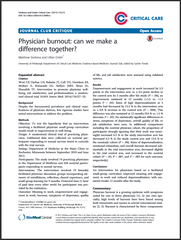Physician burnout: can we make a difference together?
Auteur Matthew Siedsma
Auteur Lillian Emlet
Volume 19
Pages 273
Publication Critical Care (London, England)
ISSN 1466-609X
Date 2015
Résumé BACKGROUND: Despite the documented prevalence and clinical ramifications of physician distress, few rigorous studies have tested interventions to address the problem. METHODS: OBJECTIVE: To test the hypothesis that an intervention involving a facilitated physician small-group curriculum would result in improvement in well-being. DESIGN: A randomized clinical trial of practicing physicians. Additional data were collected on nontrial participants responding to annual surveys timed to coincide with the trial surveys. SETTING: Department of Medicine at the Mayo Clinic in Rochester, Minnesota between September 2010 and June 2012. PARTICIPANTS: The study involved 74 practicing physicians in the Department of Medicine and 350 nontrial participants responding to annual surveys. INTERVENTIONS: The intervention involved 19 biweekly facilitated physician discussion groups incorporating elements of mindfulness, reflection, shared experience, and small-group learning for 9 months. Protected time (1 hour of paid time every other week) for participants was provided by the institution. OUTCOMES: Meaning in work, empowerment and engagement in work, burnout, symptoms of depression, quality of life, and job satisfaction were assessed using validated metrics. RESULTS: Empowerment and engagement at work increased by 5.3 points in the intervention arm vs. a 0.5-point decline in the control arm by 3 months after the study (P = .04), an improvement sustained at 12 months (+5.5 vs. +1.3 points; P = .03). Rates of high depersonalization at 3 months had decreased by 15.5 % in the intervention arm vs. a 0.8 % increase in the control arm (P = .004). This difference was also sustained at 12 months (9.6 % vs. 1.5 % decrease; P = .02). No statistically significant differences in stress, symptoms of depression, overall quality of life, or job satisfaction were seen. In additional comparisons including the nontrial physician cohort, the proportion of participants strongly agreeing that their work was meaningful increased 6.3 % in the study intervention arm but decreased 6.3 % in the study control arm and 13.4 % in the nonstudy cohort (P = .04). Rates of depersonalization, emotional exhaustion, and overall burnout decreased substantially in the trial intervention arm, decreased slightly in the trial control arm, and increased in the nontrial cohort (P = .03, P = .007, and P = .002 for each outcome, respectively). CONCLUSIONS: An intervention for physicians based on a facilitated small-group curriculum improved meaning and engagement in work and reduced depersonalization, with sustained results 12 months after the study.
Chercher cette référence sur : Google Scholar, Worldcat
doi:10.1186/s13054-015-0990-x
Laisser une réponse
Vous devez etre connectez Pour poster un commentaire









